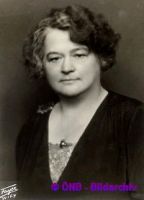Adelheid Popp
Fighter for women’s rights
Adelheid Popp’s path of life is that of a social climber: from a proletarian to an author and parliamentarian. With all her energy she stood up for social and legal improvements of working-class women.
Stemming from a worker’s family, her frame conditions were much more precarious than that of aristocratic or middle-class women. Her father was an alcoholic, her mother gave birth to 15 children, thereof 10 died in early childhood. Adelheid was the youngest of the 5 remaining children. Her childhood was a typical proletarian one of that time: miserable education which she had to give up after 3 years, paid workmanship from the age of 10 years on, forgoing each kind of childlike pleasure and always being dependent on the charity of others to be able to survive.
Her mother was neither able to read nor to write. In her opinion it was unnecessary for her children to visit school. She was almost hostile against her daughter, who read books in the evenings after her work in the factory. For Adelheid, a new world was revealed by her reading. Slowly, she began to realize that the situation of the workers and her families didn’t have to be something unalterable.
As a young girl she worked in many factories, worried about the exploitation of the female wageworkers and began to read the party programs of the burgeoning social democracy. She sneaked into the men’s party meetings. At the age of 17 she held her first blazing speech and was afterwards invited to write for a relevant journal. Agitation, writing and work for the party dominated her leisure time from now on. Very early she joined the Social Democratic Workers’ Party. In her first book “Jugendjahre einer Arbeiterin” (youth of a female worker) she described – at first anonymously – the dull situation of these proletarians. With this publication she caused a stir. The book was translated into 10 languages.
Adelheid Popp became one of the most important pioneers of the social democratic feminist movement. From her own experience she knew how important education was for women and girls, she acceded the “Wiener Arbeiterinnenbildungsverein” (Viennese Association for female Workers’ Education) and founded the “Verein der sozialdemokratischen Frauen und Mädchen” (Association of social democratic Girls and Women) together with Therese Schlesinger. For the male social democrats didn’t by all means support her claims for the improvement of the situation of women – as, for instance, equalization in marriage, voting right also for women, prohibition of night work, maternity leave for mothers, etc. Therefore she also appealed to the women:
“The legislation will have to open the doors for women the earlier, the earlier the women themselves realize that the obligations imposed on them demand for this right” (Popp: “Youth of a female worker”).
Her social politic engagement also depicted the situation of the exploited home workers and the working conditions of the “domestic slaves”. (Her 2. book, 1912)
In 1918, she was elected into the party executive committee of the Social Democrats and the district council. From 1923 to 1933 she worked as a parliamentarian. She succeeded in climbing from a proletarian to a parliamentarian due to the pursuit of her requests with endurance and passion, even against the resistance of some of the male colleagues..
In her private life she had to accept many strokes of fate. Her husband died after only eight years of marriage. Both of her sons died very early, too. One of them in World War I and the second one was consumed by pneumonia.
Though Adelheid Popp was not forgotten as a pioneer of women’s rights, women of the 20th and 21st century don’t think much about the commitment of this brave woman of the 19th century, who we owe so many of our present-day achievements.
Sources
- Popp, Adelheid: Jugendjahre einer Arbeiterin, Vlg. J.H.W. Dietz, Bonn, 1991
- http://www.dasrotewien.at/popp-adelheid.html
Photocredits: Adelheid Popp, author unknown
Source: Picture Archive ONB Pf 1909C1 friendly permission ONB (Austrian National Library) of 20.01.2014
http://www.fraueninbewegung.onb.ac.at/Pages/PersonDetail.aspx?p_iPersonenID=8674924




